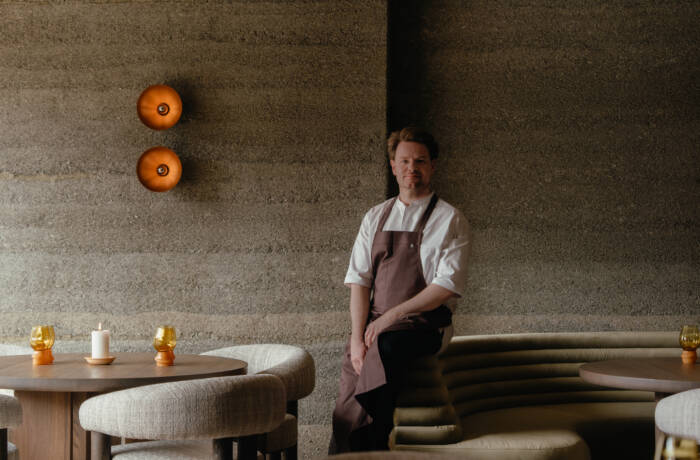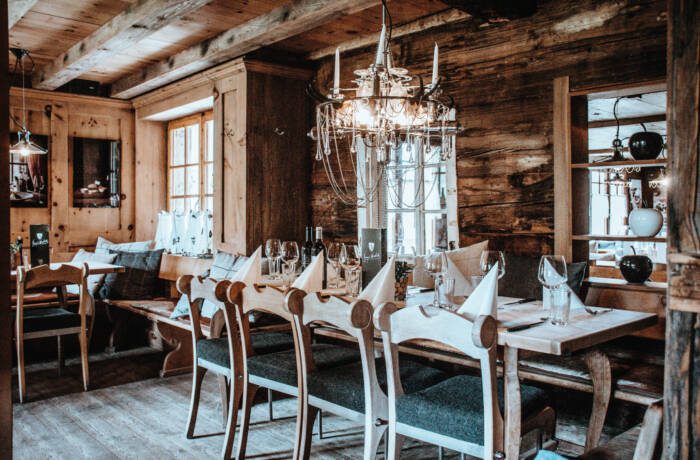Presiding over a global restaurant empire, spanning Bahrain to Boston, Wolfgang Puck is one of the world’s most celebrated chefs. He speaks to Alice Clarke about food, family, canned pineapple and Coco Chanel

Top Tables
Wolfgang Puck’s restaurants include Hotel Bel-Air in Los Angeles (above), and CUT at 45 Park Lane, London
Alice Clarke: Did you love cooking as a child?
Wolfgang Puck: My mother was a chef and I helped her to cook at home. I loved pastries and sweets more than anything back then. When I was 14 I left home to start an apprenticeship with a chef 50 miles away. That was a long way and it was hard when you had to work on the weekend and all your friends were playing or going skiing. It was only when I went to France that I realized that this is what I wanted to do. I was working in a restaurant in Provence called L’Oustau de Baumanière, which had three Michelin stars and was run by the legendary Raymond Thuilier.
AC: Do you look back and think of Thuilier as your mentor?
WP: Yes, he was in a way. I remember when I came to Los Angeles with a friend who’d also worked there and we said, ‘OK, we’re going to open a restaurant like Baumanière’.
AC: It’s interesting to see how some chefs have been so influenced by those who they trained under.
WP: Well, I think you get into a certain style and if you’re happy with it, you don’t change. For me it was different – I always tried to experiment and do new things. That’s why I’ve been married three times! Just kidding… But with regards to restaurants, I was interested in so many different things. After I’d opened Spago [in West Hollywood in 1982] I didn’t want to open another branch next, that would be too boring. Instead, I wanted to have a Chinese restaurant, so I launched Chinois [in Santa Monica, 1983], which was the first Asian-American fusion restaurant. I didn’t even know how to make fried rice at the time but I said, ‘I’m going to learn my own way’.
AC: Is there one particular cuisine that you enjoy the most?
WP: I love spices, but I also love the simplicity of a restaurant like CUT [with branches in Beverly Hills, Las Vegas, London, Bahrain, Dubai and Singapore], where you know exactly what you’re getting and it’s the best quality. It’s almost like if you get a great dress and it fits perfectly, you don’t need too much jewellery. Or if you have great earrings, you don’t need a necklace or rings. Coco Chanel said that before you leave the house, you should take two things off; that way you’re going to look better. I think it’s the same with food. If we pair it down, make it more minimalistic, it’s often better.
AC: There seems to be a real movement towards organic, fresh, sustainable food at the moment. Are you on board with that?
WP: Well, I grew up on a farm in Austria, so when we had salad we got it from the garden, and if we had vegetable soup we picked some carrots, cauliflower, beans or whatever, cut them up and made soup. So for me, there has never been anything so new about that. What was exotic and interesting was canned pineapple. I remember the first time somebody bought me canned pineapple from Hawaii, I thought: ‘Wow that’s exotic, that’s amazing’. I opened it and ate it really slowly. When I was younger we went to the forest and picked raspberries, blueberries, blackberries and white strawberries. In early spring my mother planted radishes and things like that, so by Easter we had the first fresh salad. Now all of a sudden in America everyone talks about ‘from farm to table’. I’ve never known anything different!

Fresh Start: Proving breakfast is the most important meal of the day, CUT is also a top spot for brunch
AC: Do you cook to relax?
WP: Oh yes. When I tell people I cook at home they say, ‘What do you mean? Don’t you already do enough?’ But I really like it. My children love it, too. My nine-year-old loves food. If he doesn’t get out of bed, I tell him I’m going to make scrambled eggs without him. He jumps up, comes downstairs, breaks the eggs, and has to cook it with me.
AC: Are there any chefs at the moment who you are particularly impressed by?
WP: I think Grant Achatz is one of the most talented chefs in America. He makes his own thing, a little bit out there, but very interesting– like Heston [Blumenthal] with The Fat Duck.
AC: What is your latest cookbook about?
WP: Wolfgang Puck Makes it Healthy is about eating better and exercising. I go skiing with the likes of [downhill champion] Franz Klammer but for about nine years, even if we weren’t going fast, I had to keep stopping to breathe. Similarly, I was playing tennis in Maui, where it is quite hot and humid, and after about 10 minutes I had to sit down as I couldn’t breathe anymore. I thought to myself, ‘I have to change my lifestyle and also start to exercise and eat better’. This book is really a result of that.
AC: How do you get people to eat more healthily?
WP Even if you go to a cheap grocery store, that’s still better than buying canned or frozen food. We should say to ourselves, ‘Okay, I like rice, why don’t I buy brown rice’, which has more flavour and is better for you. And the same with pasta. Once you get used to eating wholewheat pasta, you realize it’s really tasty and all of a sudden you think regular pasta is bland. So little by little you can try things out and begin to understand what is good and not so good for you. I also think that, in America especially, the portion sizes are too big. People think they have to eat a lot, but they don’t. In fact, they say you actually live longer if you eat less.
AC: You do a lot of charity work. Can you tell us about your philanthropic endeavours?
WP:In 1982 we started to do events with some chefs and wineries, so we called it The American Food and Wine Festival. We donated the money raised to ‘meals on wheels’, which provides food for old people, for people who don’t have any money and so on. We then started a cancer benefit for people who can’t go to hospital for treatment. We do a big event in Las Vegas for Alzheimer’s sufferers, because my mother had Alzheimer’s. We also do a big event in Cleveland for children at a cancer clinic there, too. We do a lot of work with schools, plus my wife has an orphanage accommodating 700 children in Ethiopia. So that alone is quite a lot of work!

Shooting Stars: Spago in Beverley Hills is one of only three restaurants in LA to hold two Michelin stars
AC:Do you find it hard to juggle everything?
WP:Sometimes, yes, it’s complicated and difficult. I have very good people who have worked with me for a long time though, so that helps.
AC: What has been your favourite meal recently?
WP: I had dinner last night at Alain Ducasse’s latest restaurant at the Plaza Athénée in Paris. I liked it a lot because it was so different; it was a really interesting experience. Sometimes the whole experience is better than each dish. I told them I only had one hour and they served me 10 different dishes. Three-star fast food!
AC: Your first restaurant, Spago, opened in 1982. Do you still feel as inspired by food today as you were back then?
WP Oh yes, I still love it just as much. If not, I wouldn’t be here.










